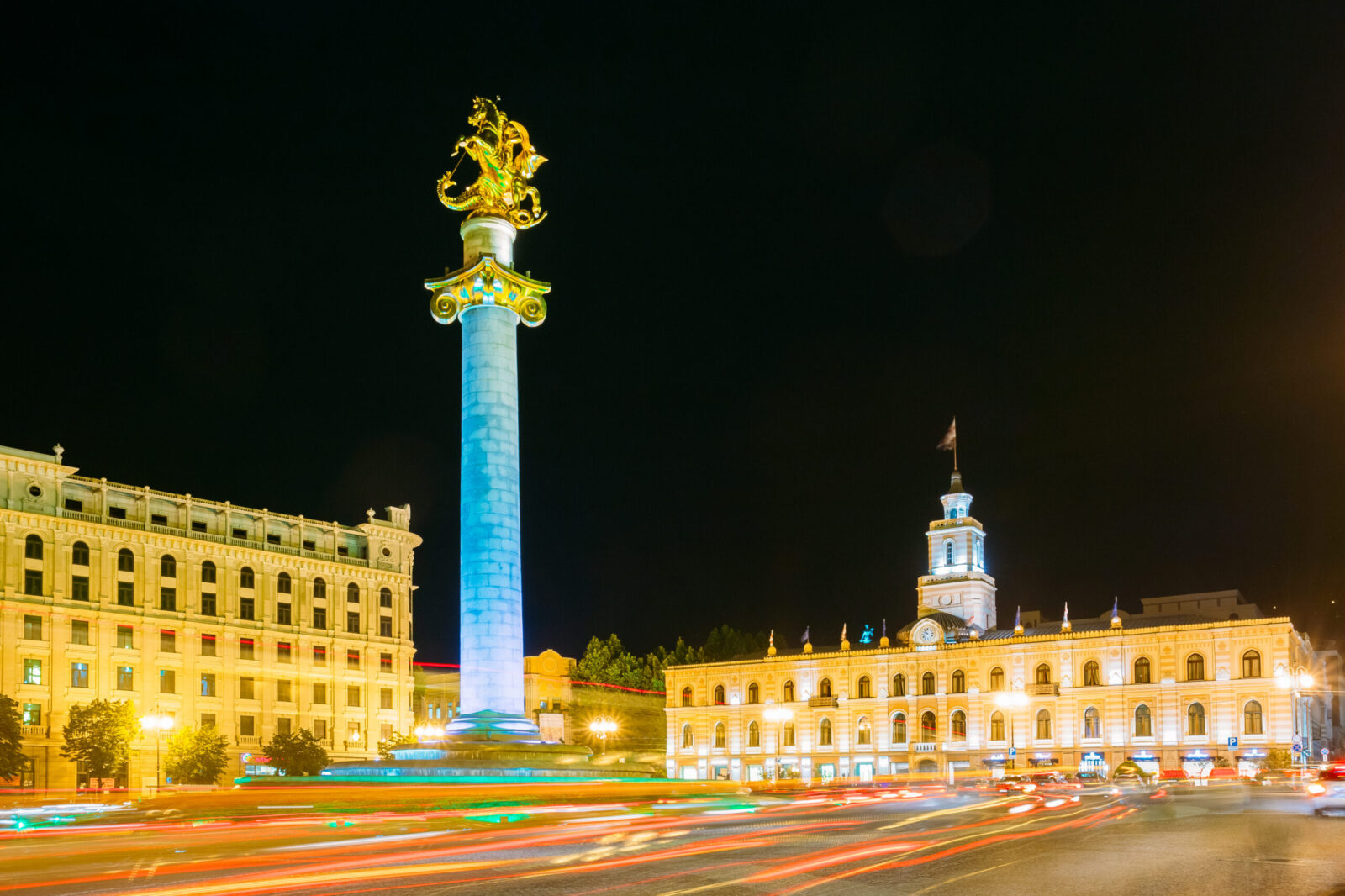Georgian citizens prepare for 2024
It looks likely that Georgia will make a choice between East or West next year. While the government continues to favour stronger links with Russia, the Georgian people still show great support for European integration. The upcoming parliamentary elections will therefore prove pivotal.
December 20, 2023 -
Mark Temnycky
-
Articles and Commentary

Night view of the Freedom Square in Tbilisi. Photo: George Trumpeter / Shutterstock
Next year will prove to be very important for Georgia. In the coming months, Georgian citizens will prepare for the country’s parliamentary elections. The results of the election will be vital.
Over the past year, the ruling Georgian Dream party has made several questionable decisions. The government sought to increase surveillance across the country, targeting political opponents. It has also spread conspiracy theories about attempted coups designed to overthrow the government. Its members have even tried to label various organisations that do not align with the party as “foreign agents”. Finally, the party has slowly established closer relations with Russia while distancing itself from the West.
These events are not reflective of the Georgian people. According to a public opinion survey conducted by the International Republican Institute, 40 per cent of citizens who participated in the poll said that they oppose relations with Russia. In addition, 79 per cent of surveyed individuals stated that Russia’s aggression toward Georgia was ongoing. Meanwhile, 86 per cent of participants supported Georgia joining the EU. Finally, 74 per cent of those surveyed said they would support joining the EU at the expense of cutting trade relations with Russia.
The Georgian people are not alone. For example, President Salome Zourabichvili and opposition political parties have stated that they favour a path toward European integration. This month, the Georgian president participated in a march with Georgian citizens to support Georgia’s EU membership bid. Zourabichvili has also met with European officials, much to the dismay of Georgian Dream. Finally, opposition groups have continued to pressure the ruling party, pushing it to reform the government so that Georgia can ultimately achieve EU candidate status. Most recently, the European Commission recommended that the European Council grant “Georgia the status of a candidate country”. The European Council will now be gathering in Brussels this week to discuss various issues, one of which will be Georgia’s potential EU membership. As a result, opposition groups are working hard to ensure that Georgian Dream does not derail this opportunity, all the while hoping that the European Council will reach a positive consensus. These aspirations were then achieved when the European Council granted EU candidate status to Georgia on December 14.
Now, 2024 will now be a showdown between individuals in Georgia who support closer ties with Russia, and citizens who favour European integration. Public opinion polls suggest that the Georgian public overwhelmingly supports the second option. However, the country’s current ruling political party favours the other.
The period leading up to the parliamentary elections will be tense. A total of 76 seats are required to win a majority in the Georgian parliament. During the 2020 Georgian parliamentary elections, Georgian Dream won the popular vote, claiming 90 seats. Now, after some recent scandals and various resignations, Georgian Dream is down to 75 seats. As a result, the ruling party will have to work hard to try and maintain its majority in Georgia’s parliament.
It also appears that support for Georgian Dream is dropping. According to a recent poll by the International Republican Institute, only 25 per cent of participants had a favorable opinion of Georgian Dream. But despite this low rating, survey participants also expressed negative views regarding the other political parties within Georgia. This has resulted in a predicament. On the one hand, Georgian citizens differ from Georgian Dream when it comes to the future of their country. They favour closer relations with the EU and oppose stronger ties with Russia. However, Georgian citizens do not have strong opinions on Georgian Dream. Public opinion polling shows that Georgian citizens do not view the country’s other political parties more favourably, meaning that there will be challenges during next year’s crucial election.
Finally, the European Union and Russia will likely face a showdown to see who will win influence in Tbilisi. Currently, the European Commission stated that Georgia’s long-awaited candidate status should be granted, but it also stated that the government needed to address the Commission’s nine recommendations. Should Georgia fail to reform its government and fulfil the nine criteria in question, then this would stunt Georgia’s path toward European integration. Russia would favour such developments as it tries to hold onto Georgia as part of its sphere of influence. Unlike many other countries in the region, Russia’s economic relations have increased with Georgia throughout its full-scale military incursion into Ukraine. The Russians will be determined to maintain these economic relations, hoping that Georgia is not pried away from them by the Europeans. There are also concerns that if Georgia proceeds down the path toward European integration, then the Russians may renew their fighting with the Georgians. This would only further hinder Russo-Georgian relations, and it would force the Georgians to push more toward EU integration.
In other words, there is a lot at stake in the 2024 parliamentary elections in Georgia. If Georgian Dream maintains its majority, then it is likely that the ruling party will continue to press for autocratic legislation and stronger ties with Russia. But if the opposition leaders win, then they will continue to work hard to reform Georgia’s government so that it can one day join the European Union as a full member.
Georgia’s future is at stake in 2024. Time will tell who will prevail.
Mark Temnycky is an accredited freelance journalist covering Eurasian affairs and a nonresident fellow at the Atlantic Council’s Eurasia Center. He can be found on X @MTemnycky
Please support New Eastern Europe's crowdfunding campaign. Donate by clicking on the button below.

































